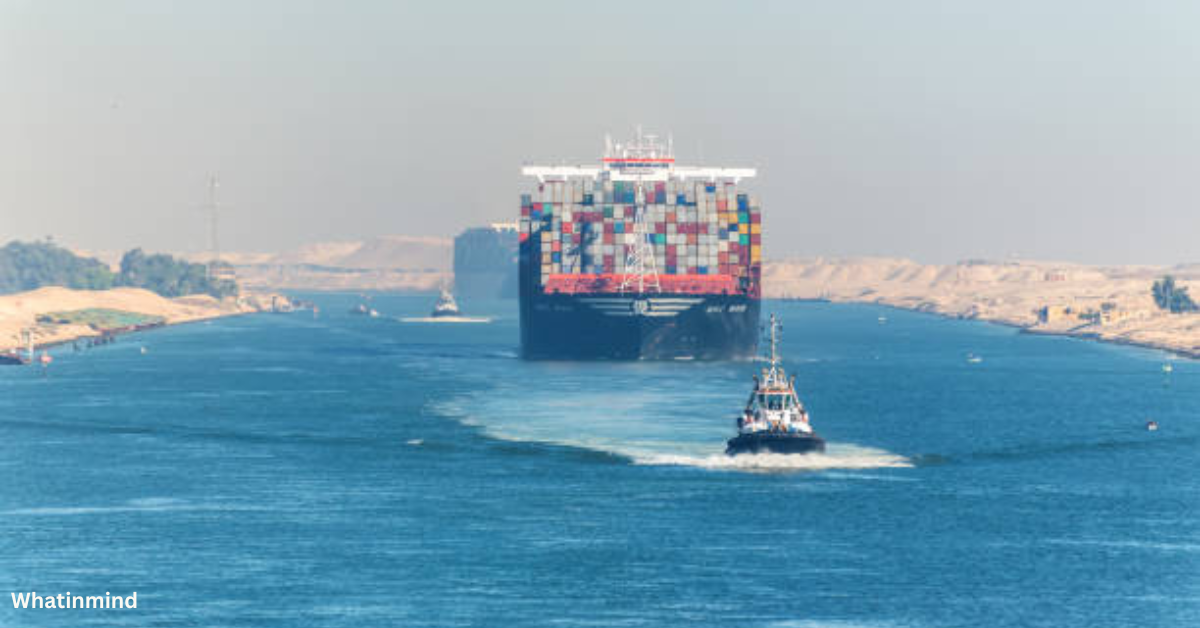Why does the suez canal keep getting blocked and what is the …
The repeated blockages at the Suez Canal have sparked global attention, prompting a closer examination of the underlying factors contributing to these disruptions. From historical precedents to the recent high-profile incident involving the Ever Given, the reasons behind these blockages are multifaceted.
Understanding the complexities of navigation challenges, economic implications, and geopolitical ramifications surrounding the canal is essential to grasp the full scope of this recurring issue. As we investigate into these aspects, a clearer picture emerges, shedding light on the broader significance of the Suez Canal and the ongoing efforts to mitigate such disruptions in the future.
History of Suez Canal Blockages
Throughout its history, the Suez Canal has faced several significant blockages that have had far-reaching impacts on global trade and maritime navigation. One of the most notable incidents occurred in 1956 when the Suez Crisis led to the canal’s closure for nearly a year. This closure disrupted the flow of goods between Europe and Asia, prompting an impact assessment that revealed the economic repercussions of such an event.
In more recent times, the world witnessed another major blockage in March 2021 when the Ever Given, one of the largest container ships globally, became lodged sideways in the canal. This incident resulted in a halt of traffic through the crucial waterway for six days, leading to significant delays in shipments and a thorough economic impact assessment being conducted to understand the repercussions on global trade.
These blockages underscore the importance of the Suez Canal to international commerce and highlight the need for effective measures to prevent such disruptions in the future.
Impact on Global Shipping Routes
The recent blockage in the Suez Canal caused by the Ever Given container ship has had profound ramifications on global shipping routes, disrupting the normal flow of maritime traffic and triggering a ripple effect across international trade networks. This disruption led to significant shipping congestion, delaying the transportation of goods and raw materials vital for various industries worldwide.
The blockage highlighted the critical role the Suez Canal plays in facilitating maritime traffic between the East and the West, underscoring its importance in maintaining the efficiency of global trade routes. The incident also shed light on vulnerabilities in the maritime transportation sector, prompting a reassessment of contingency plans to mitigate future disruptions.
The impact reverberated throughout the global economy, affecting supply chains and causing financial losses for businesses reliant on timely deliveries. As efforts were underway to clear the canal and resume normal operations, stakeholders worked towards addressing the challenges posed by the blockage to prevent similar incidents from destabilizing international trade in the future.
Navigation Challenges in the Canal
Amid the aftermath of the Suez Canal blockage caused by the Ever Given container ship, the intricacies of piloting this essential waterway have come under heightened scrutiny, shedding light on the various challenges faced by vessels transiting through this critical maritime artery.
One of the primary navigation challenges in the Suez Canal is the sheer size of modern vessels. As ships have grown larger over the years to accommodate increasing cargo demands, maneuvering these massive vessels through the narrow canal presents a significant challenge. Ship captains and pilots must navigate through the canal’s relatively tight quarters with precision to avoid accidents and disruptions to the waterway.
Moreover, the maintenance of the canal plays a critical role in ensuring smooth navigation. Regular dredging operations are necessary to keep the canal deep enough for large vessels to pass through safely.
Additionally, ongoing maintenance of navigational aids such as buoys and lights is essential for guiding ships along the correct path. Addressing these navigation challenges and investing in canal maintenance are crucial steps to prevent future blockages and maintain the efficient flow of maritime traffic through the Suez Canal.
Ever Given Incident Analysis
The Ever Given incident in the Suez Canal brought about a significant grounding that led to an in-depth economic impact assessment. This incident not only disrupted global trade but also highlighted the fragility of the interconnected supply chain systems worldwide. Understanding the specifics of the grounding, its financial repercussions, and the ensuing trade disruptions is essential in comprehending the broader implications of the Ever Given incident.
Ever Given Grounding
With the grounding of the Ever Given container ship in the Suez Canal, a critical incident unfolded that had far-reaching implications for global trade and shipping. Grounding incidents like this raise concerns about maritime safety and the potential risks involved in maneuvering busy waterways.
The Ever Given’s grounding not only blocked one of the world’s most crucial shipping routes but also highlighted the importance of effective navigation protocols and emergency response procedures in preventing and managing such crises. This incident serves as a reminder of the complex challenges faced in ensuring the smooth operation of maritime transportation and the need for continuous efforts to enhance safety measures to prevent similar incidents in the future.
Economic Impact Assessment
An analysis of the economic impact resulting from the Ever Given incident in the Suez Canal reveals significant repercussions for global trade and commerce. The financial implications of this blockage have been substantial, with billions of dollars in goods delayed or rerouted. This event highlighted the importance of supply chain resilience, prompting businesses to reassess their logistical strategies to mitigate future disruptions.
Market volatility was also evident, as the blockage led to fluctuations in commodity prices and shipping rates. In response, there has been a growing emphasis on trade route diversification to reduce dependency on key chokepoints like the Suez Canal. Moving forward, stakeholders are expected to prioritize risk management and contingency planning to enhance the stability of international trade networks.
Global Trade Disruption
Amidst the aftermath of the Ever Given incident in the Suez Canal, a profound disruption in global trade has unfolded, underscoring the intricate interconnectivity and vulnerability of international supply chains. The blockage led to widespread shipping congestion, affecting various industries reliant on timely deliveries.
Trade agreements have been strained as delays in cargo transportation have ripple effects on economies worldwide. This incident highlighted the fragility of the global trade network and the importance of contingency planning in mitigating future disruptions.
Businesses are now reevaluating their reliance on key shipping routes and considering diversifying their transportation methods to minimize such risks. The Ever Given incident serves as a stark reminder of the complexities and challenges inherent in the interconnected world of international trade.
Economic Consequences of Blockages
The blockage in the Suez Canal has led to significant economic consequences, affecting global trade flows and causing supply chain delays. Countries reliant on the canal for trade are experiencing disruptions, impacting industries worldwide. The incident has highlighted the vulnerability of interconnected economies and the need for contingency plans in the face of such disruptions.
Trade Disruption Impact
The disruption of global trade routes due to blockages like the recent one in the Suez Canal can have profound economic ramifications, impacting industries, supply chains, and financial markets worldwide. Trade agreements play a pivotal role in determining how countries interact economically, and blockages can lead to violations or renegotiations of these agreements.
Additionally, maritime regulations govern the safe and efficient movement of goods across oceans; blockages can highlight the importance of adhering to these regulations to prevent similar incidents in the future. The economic consequences of trade disruptions can be significant, leading to delays in the delivery of goods, increased costs for businesses, and potential shifts in global trade patterns as countries seek alternative routes to mitigate such risks.
Supply Chain Delays
Supply chain delays resulting from blockages in key maritime routes can have far-reaching economic implications for global industries and businesses. The recent blockage in the Suez Canal highlighted the vulnerability of supply chains to disruptions, emphasizing the importance of supply chain resilience. When goods are held up due to logistical challenges, businesses face increased costs, delayed deliveries, and potential production halts. This can lead to inventory shortages, decreased customer satisfaction, and financial losses. To mitigate these risks, companies are now focusing on enhancing their supply chain resilience by diversifying transportation routes, increasing inventory buffers, and improving communication with suppliers and customers. By proactively addressing logistical challenges, businesses can better navigate unexpected disruptions and maintain smoother operations.
Global Economic Repercussions
Blockages in key maritime routes, such as the recent disruption in the Suez Canal, can have profound global economic repercussions, impacting various industries and businesses worldwide. The blockage highlighted supply chain vulnerabilities, revealing the risks associated with relying heavily on a single trade route. Companies faced delays in receiving essential supplies, leading to production halts and increased costs due to rerouting. This event emphasized the importance of trade route diversification to mitigate future disruptions.
Businesses are now considering alternative routes and transportation modes to build more resilient supply chains. The economic impact of such blockages serves as a wakeup call for organizations to reassess their logistical strategies and adapt to a rapidly changing global trade landscape.
Efforts to Prevent Future Disruptions
Efforts are underway to implement robust measures ensuring the seamless flow of maritime traffic through the Suez Canal and prevent future disruptions. To enhance the canal’s operational efficiency and reduce the risk of blockages, a combination of prevention strategies and technological solutions is being considered.
One of the primary prevention strategies involves improving navigation and communication systems. Implementing advanced technologies such as satellite tracking, automated vessel identification, and real-time monitoring can help prevent human errors and enhance overall safety. Additionally, conducting regular maintenance dredging to deepen and widen the canal, especially in important areas, can mitigate the chances of grounding incidents.
Moreover, the development of emergency response plans and the establishment of rapid intervention teams can guarantee swift resolution in case of potential blockages. Simultaneously, investing in training programs for canal pilots and crew members to enhance their skills and knowledge can contribute greatly to preventing accidents.
Geopolitical Significance of the Canal
The strategic location of the Suez Canal has long been a focal point in global geopolitics, influencing international trade routes and shaping diplomatic relations among key stakeholders. Canal geopolitics play an important role in determining the balance of power in the region and beyond. The canal serves as a key link between the Mediterranean Sea and the Red Sea, providing a shortcut for ships traveling between Europe and Asia. This strategic waterway not only impacts trade implications but also holds significant importance in international relations.
The geopolitics of the Suez Canal have a direct impact on the shipping industry, as any disruptions or blockages can lead to delays in maritime transportation, affecting global supply chains and the movement of goods. Countries and companies reliant on the canal for trade are keenly aware of its geopolitical significance and closely monitor developments that may influence its operation. The canal’s important importance underscores the need for diplomatic cooperation and careful navigation of international relations to make sure its continued function as a key artery of global trade.
Frequently Asked Questions
How Does the Suez Canal Impact Local Wildlife and Ecosystems?
The Suez Canal’s presence directly impacts local wildlife and ecosystems, affecting biodiversity conservation efforts. Navigation, pollution, and habitat disruption pose significant challenges. Mitigation measures are essential for preserving the delicate balance of the surrounding environment.
Are There Any Specific Safety Measures in Place for Ships Passing Through the Suez Canal?
Safety protocols in the Suez Canal are thorough, encompassing rigorous navigation technology and constant monitoring. Vessels adhere to designated routes, maintain safe speeds, and receive pilot assistance, ensuring smooth transits through this crucial waterway.
What Are Some Alternative Routes That Ships Can Take if the Suez Canal Is Blocked?
Maritime routes offer shipping alternatives when the Suez Canal is blocked. Vessels can navigate around Africa’s Cape of Good Hope or opt for the Northern Sea Route through the Arctic. These detours secure continued global trade flow.
How Do Blockages in the Suez Canal Affect the Prices of Goods and Services Around the World?
Blockages in the Suez Canal greatly impact global trade, leading to supply chain disruptions and market volatility. According to the World Bank, each day of closure costs the world economy around $9 billion, underscoring the economic implications.
What Role Do International Organizations Play in the Management and Maintenance of the Suez Canal?
International organizations, such as the International Maritime Organization, oversee Suez Canal regulations and environmental impact assessments. They facilitate funding mechanisms for maintenance. These efforts guarantee smooth global trade relations by upholding international standards and mitigating environmental risks.
Conclusion
To sum up, the recurring blockages in the Suez Canal have created a turbulent sea of uncertainty for global shipping routes, causing economic ripples worldwide. Efforts to steer these challenges and prevent future disruptions are vital in maintaining the smooth flow of international trade. Like a ship steering through turbulent waters, the Suez Canal must be carefully managed to guarantee its continued significance in the geopolitical landscape.






